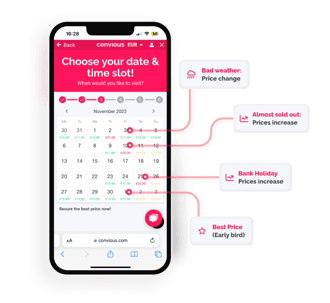How Convious calculates your prices.
It's not magic - it's data!
In the words of science writer Arthur C. Clarke “Any sufficiently advanced technology is indistinguishable from magic.”
Unfortunately, any sufficiently advanced technology, just like any other magic trick, also tends to be opaque. If it weren’t, everyone would be able to unveil its secrets.
Of course, magic has its charm, but when you’re investing and betting it all on technology, it’s only fair that you get to find out what’s happening within that "black box", isn’t it?
So in this article, we’re taking you backstage on an exploration of Convious’ dynamic pricing, which by the way, has nothing to do with magic and everything to do with technology and data.
Dynamic Pricing is one of the many pricing types that our solution offers for your online ticket sales.
1. A word on dynamic pricing.
Dynamic pricing. You’ve already heard about it a hundred times. In fact, you’ve probably also experienced it a hundred times more. Happy hours at your local bar, plane tickets, hotel room bookings, or even catching an Uber all involve dynamic pricing.
In fact, any business that is setting flexible prices that vary along with real-time market demands is using dynamic pricing. And what we do here at Convious is pretty much the same as how those companies work, adapting to market conditions.
But how exactly do we do that?
2. Data is our magic word when it comes to generating prices.
For Real-Time Pricing (which is dynamic pricing in its purest form), our system predicts and takes into consideration two factors:
o What’s the demand: meaning how popular a certain thing is (that thing is a specific day of the week or time-slots, time ranges, etc.)
o Urgency: how much the market needs a certain thing. For example, Tuesday can be a very slow day for most leisure venues, but it can also occur that a specific niche segment can only visit that venue on a Tuesday and that therefore, there’s a higher urgency component for them by which they might be more ready to pay a higher price.
If you’re still slightly confused about Real-Time Pricing and how it differentiates from dynamic pricing, we’ve got an article that will quickly clear that up for you: Dynamic pricing Vs. Real-Time Pricing.
But what sort of variables is the Convious system taking into account exactly? Glad you asked.
With every event* of our customers on-site, our system tracks:
- The weather forecast (this includes variables such as temperature, the intensity of precipitation and the chance of precipitation).
- Holidays and seasonality
- Most popular days and times (Convious checks when your venue is most crowded).
*Event: Any page view or click, basically. Actions such as adding to a cart, clicking in a calendar (selecting a date), choosing a product, selecting a time slot, increasing the number of visitors per product, etc.
And with the gathered data, Convious will forecast:
- Lead Time: The system will determine how much in advance your users will buy.
- Demand: The system will predict the demand based on your previous and real-time data.
- Expected Visitor numbers: Based on actual ticket sales and external data points such as weather.

And with this information, we connect the dots, and the magic starts to kick in: Convious’ algorithm generates your monthly pricing calendar with tailored prices for each of the days depending on all the aforementioned circumstances and market conditions.
But it doesn’t stop there. Every single day, the algorithm is also continuously checking your sales in the last 15 minutes as well as your business goals. That way, if the system finds out that you are underperforming in sales in regard to your goal, it will automatically adjust by lowering the prices. And on the contrary, if the system sees that you’re selling more than expected, it will adjust the prices to maximize revenue. It’s called smart pricing for a reason!
So there you have it! The real process behind our “dynamic pricing magic” is essentially that, our AI-powered pricing technology ties factors like weather, seasonality, inventory, and historical data together to determine -automatically and with great accuracy -what are the best real-time prices for your venue.
As a result, this helps you increase your revenue and, more importantly, become more adaptable to market changes and spread your visitors better so you can improve their experience.
If you'd like to get to know more about the topic, or give your venue a boost with the power of dynamic pricing, get in touch with our team. We are here to help you reach your full potential.
